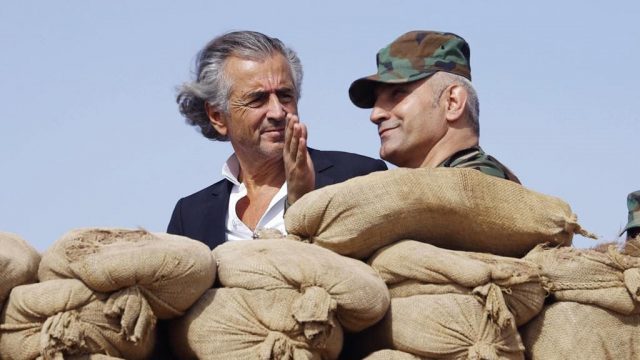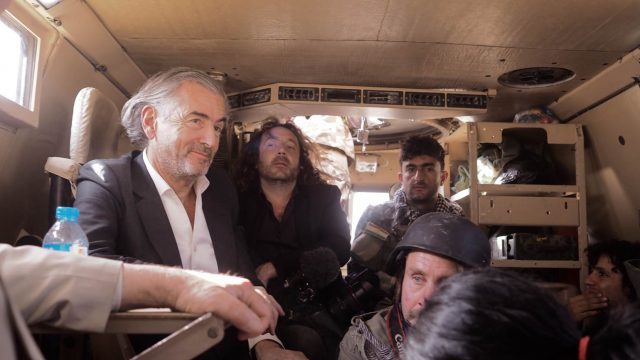
Bernard-Henri Lévy speaks with General Maghdid Harki in gripping war documentary Peshmerga
Quad Cinema
34 West 13th St. between Fifth & Sixth Aves.
January 10-16
212-255-2243
quadcinema.com
In the introduction to his most recent book, The Empire and the Five Kings: America’s Abdication and the Fate of the World, published in February 2019, controversial and provocative Algerian-born French Jewish philosopher Bernard-Henri Lévy writes, “When I review the reasons why, at this stage of my life, I poured so much energy into the cause of the Kurds and Kurdistan, this is what comes to mind. The justice of the fight, of course. . . .
“Next, there is the debt they are owed. The indelible debt that the world owes to the only armed force that, when ISIS appeared and the region was frozen stiff with terror, dared fight it face-to-face. It was because I was aware of this debt that I, with a small band of friends, came to the region between July and December 2015 to shoot a documentary film, Peshmerga, along the six-hundred-mile front that the Kurds were holding, alone, against the fanatics of the Islamic State. It was because I was aware that these men and women — the Peshmerga includes battalions of women — were the first line of defense not only of Kurdistan but of the world, that I left Europe again in November 2016, on the first day of the fight for Mosul, to make a second documentary, The Battle of Mosul, about the liberation of the most important city of the Caliphate. And it was for the same reasons that I personally promoted these films wherever anyone was willing to show them, that I brought the first of them to the very symbolic great hall of the United Nations building in New York and to the hallowed dome of Congress in Washington, and that I lived those two years in step with the Peshmerga and their aspirations. These fighters were sentinels against barbarism, the world’s outposts and shields. The film crew and I deemed it essential to be the witnesses of that.”

Bernard-Henri Lévy embeds himself with Kurdish troops in The Battle for Mosul
What Lévy and his brave crew were witnesses to can be seen at the Quad, which will be hosting the series “Bernard-Henri Lévy x 4,” with the seventy-one-year-old Lévy, popularly known as BHL, making four appearances at the Thirteenth St. theater this weekend. The festival begins with the weeklong theatrical release of 2016’s Peshmerga and 2017’s The Battle of Mosul, shown as a double feature; the 7:00 screenings on January 10 and 11 will be followed by Q&As with Lévy, the first moderated by Adam Gopnik, the latter by Ben Cohen. In addition, on January 11, Lévy will introduce the 2:15 screening of 1994’s Bosnia-set Bosna! and the 4:45 screening of 2012’s The Oath of Tobruk, about the fall of Muammar Gaddafi.
Peshmerga and The Battle of Mosul are remarkable inside looks at war; Lévy, who has also directed the romance Day and Night and written such books as Who Killed Daniel Pearl?, In the Footsteps of Tocqueville, and In the Spirit of Judaism, embeds himself with the Peshmerga, troops dedicated to ridding the world of ISIS, aka Daesh; the name Peshmerga translates as “Those who stand in the face of death,” and that’s just what happens throughout the two films. Lévy rides with the Kurdish military, joining the somewhat ragtag but dedicated group of fighters as they investigate villages, journey into tunnels, and get shot at in bunkers. Along the way from Kirkuk to Erbil and Mosul, he encounters such brave men and women as General Kemal Kirkuki, General Maghdid Harki, Mike Barzani, Dr. Jacques Bérès, Prime Minister Nechirvan Barzani, Iraqi general Fazeel Barwari, counterterrorism leader Abdulwahab al-Saadi, and Helly Luv, the Kurdish Madonna who makes anti-Daesh music videos. “Daesh is the enemy of the whole world,” one soldier says, explaining why they do what they do — and are extremely successful at it. Lévy risks his life and that of his crew, which includes cinematographers Ala Hoshyar Tayyeb, Olivier Jacquin, and Camille Lotteau, one of whom gets caught in an explosion. He thankfully chooses not to show the killing of one general, who gets shot in the head while using sandbags for cover, something Lévy will never forget.
The films feature gripping scores by Nicolas Ker, Jean-Fabien Dijoud, Henri Graetz, and Jeff D., with sound by Jean-Daniel Bécache and editing by Camille Lotteau that make you feel like you’re part of the action, the threat of snipers, booby-trapped vehicles, and IEDs ever present. “Good God, how ugly, dirty, and foul war is!” Lévy cries out, but he also sees reason for hope. “The spirit of Bashiqa, the timeless alliance between Yezidis, Muslims, and Christians, promptly flourishes again,” he says at one point while also showing villagers’ respect for the history of the region’s now-departed Jewish population.
“We witnessed the astonishing spectacle of the world’s leading power consenting to the defeat and humiliation of its staunchest ally in the region,” he continues in the book’s introduction. “We saw the same President Trump, who had just declared Iran to be enemy number one in the complicated Middle East, voice no objection as Major General Qasem Soleimani, head of the Quds Force, the elite unit of the Iranian revolutionary Guards responsible for Iran’s external operations, came and went, parading around the field of battle like a conqueror and posing for photographers. . . . The Kurds perceived this nonintervention as a terrifying enigma.” It should be fascinating to hear what he has to say about Trump and Soleimani now. Lévy also notes of the fighters who lined up to vote at the ballot box, “Like them, I was thinking that this affair bore an unmistakable odor of betrayal. Like them, I was shocked by the mixture of amateurism, fecklessness, and absence of vision of the U.S. and European administrations.”